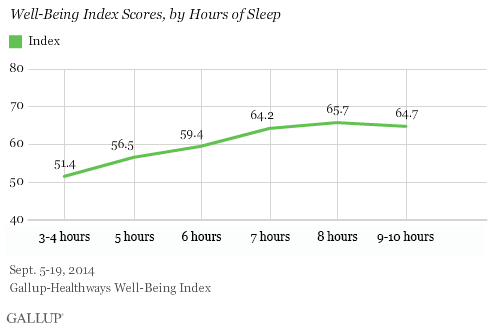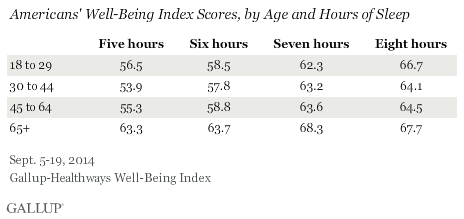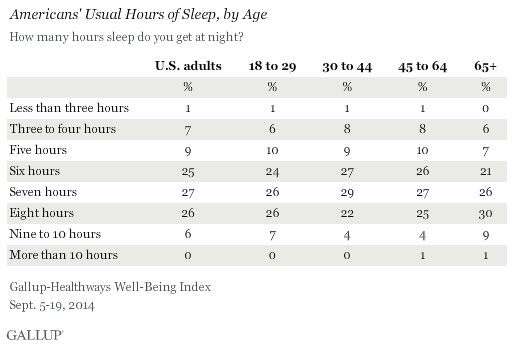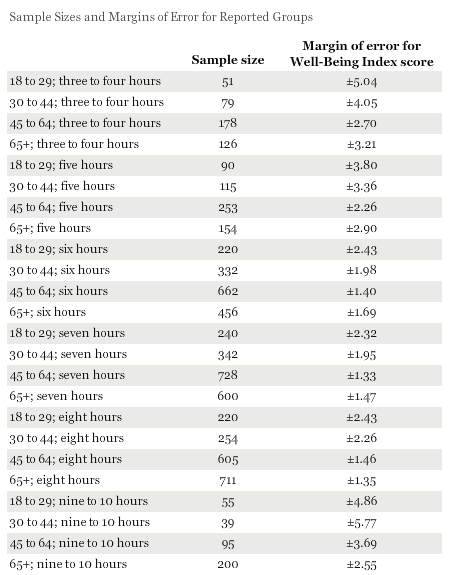Story Highlights
- Positive relationship between more hours of sleep and well-being
- For those under age 65, relationship peaks at eight hours of sleep
- In U.S., 42% of adults usually get less than seven hours of sleep
WASHINGTON, D.C. -- Americans who report that they usually get more hours of sleep per night have higher overall well-being than those who typically get fewer hours of shut-eye. Getting more hours of sleep is positively associated with having higher well-being, with the relationship peaking at eight hours and leveling off thereafter.

These data are based on interviews with 7,058 U.S. adults conducted Sept. 5-19, 2014, as part of the Gallup-Healthways Well-Being Index. The Well-Being Index measures five elements of well-being: purpose, social, financial, community and physical.
Those who usually sleep seven hours per night have a 4.8-point advantage in their Well-Being Index score over those who typically sleep for six hours. This difference is greater than the well-being advantage for those who sleep six hours versus five hours (2.9 points), and eight hours versus seven hours (1.5 points).
The link between getting more hours of sleep and higher well-being differs slightly by age. For adults aged 65 and older, the relationship peaks at seven hours of sleep. For those under age 65, it peaks at eight hours. For young adults aged 18 to 29, the well-being uptick from seven to eight hours is more pronounced than it is for adults in the middle age groups -- 4.4 points versus roughly one point, respectively.
Americans aged 30 to 64 who usually get five hours of sleep have significantly lower well-being than those who usually get six hours of sleep, which is not the case for young adults or seniors.

A strong relationship between sleep and well-being exists, but the direction of the relationship is unclear. Getting more hours of sleep could boost well-being -- or those with higher well-being may be more likely than those with lower well-being to get more sleep.
More Than Four in 10 Adults Fall Short of Recommended Amount of Sleep
Forty-two percent of U.S. adults report getting less than seven hours of sleep on a typical night, the minimum number of hours recommended by the National Sleep Foundation for those aged 18 and older. And although young adults who get eight hours of sleep have significantly higher well-being than those who get seven, 67% of 18- to 29-year-olds say they usually get less than eight hours.
Seniors are the most likely age group to get at least seven hours of shut-eye per night, with nearly two-thirds doing so.

Implications
Previous Gallup research shows that Americans are getting roughly an hour less sleep than they did in the 1940s. Fortunately, the majority of Americans are still getting at least seven hours of sleep per night -- the minimum amount recommended by the National Sleep Foundation for those aged 18 and older. But more than four in 10 U.S. adults report that they usually get less than seven hours of sleep per night. This could be a missed opportunity, given that well-being is higher among those who get seven or more hours of sleep than those who get less.
Not getting enough sleep is not only linked to lower well-being for individuals, but it is also costly to the U.S. economy. Employees may not have enough time to sleep because of working long hours, family obligations, insomnia or having poor well-being in other areas. For example, poor physical well-being, social isolation or financial strain could adversely affect quantity of sleep.
Employers can explore interventions to promote the value of sleep and its link to employees' well-being, as it relates to engagement, healthcare costs and productivity. When possible, they may want to allow employees to work flexible hours, which could make it easier for workers to balance work and family demands with getting enough sleep.
Survey Methods
Results are based on telephone interviews conducted Sept. 5-19, 2014, as part of the Gallup-Healthways Well-Being Index survey, with a random sample of 7,058 adults, aged 18 and older, living in all 50 U.S. states and the District of Columbia. For results based on the total sample of national adults, the margin of sampling error is ±1 percentage point at the 95% confidence level.

Each sample of national adults includes a minimum quota of 50% cellphone respondents and 50% landline respondents, with additional minimum quotas by time zone within region. Landline and cellular telephone numbers are selected using random-digit-dial methods.
Learn more about how the Gallup-Healthways Well-Being Index works.

